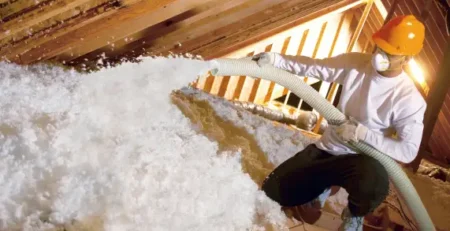Best Roofing Materials For Coastal Homes
Is Your Roof Ready for Coastal Weather? Here’s What Every Homeowner Needs to Know
Living close to the ocean can seem like heaven until a storm comes along. Salt air, strong winds, and heavy rains, all of which can destroy the wrong roof in just 5–10 years. These are a few reasons why picking the best roofing materials for coastal homes is not just a choice; it’s a must. Too many homeowners wait until their roof is already leaking or falling apart before thinking about the right materials.
But acting early can save thousands in damage and give peace of mind when the next storm rolls in. This guide will walk you through your best options based on durability, price, and protection and how to choose a coastal-proof roof that won’t rust, corrode, or blow away in the next hurricane. So you can make a smart decision without stress.
5 Best Roofing Materials for Coastal Areas
1. Metal Roofing (Best for Hurricanes)
Sleek and durable metal roofing is installed on a modern home.
When it comes to strength and durability, metal roofing often tops the list. It stands up to strong winds and lasts for decades with minimal maintenance.
Why it works:
- Best metal roofing material options like aluminium and stainless steel resist rust caused by salt.
- Great for low-pitch roofing needs and modern designs.
- Reflects heat, making it energy-efficient during hot summers.
Best for: Florida, Gulf Coast, Carolinas
Lifespan: 40–60 years
Downside? It can cost more upfront, but over time, the savings on repairs and replacements add up especially in coastal environments.
2. Asphalt Shingles – (Budget-Friendly)
A close-up view of asphalt shingles on a suburban house roof.
Many coastal homes use asphalt shingles, and for good reason: they’re affordable and easy to install. However, not all shingles are made for coastal weather.
- Choose ones rated for high-wind zones.
- Ask for algae-resistant types to prevent stains.
- Great if you need a quick roof replacement material on a budget.
Tip: Look for fibreglass-based shingles, they hold up better in salty, humid conditions.
3. Concrete Tile (Best for Salt Air)
Traditional clay tiles add charm and durability to a coastal home roof.
If you want a coastal look with real strength, clay or concrete tiles are a solid pick.
Why it works:
- Withstand strong winds and salt air without cracking.
- Naturally cool, which helps energy savings.
- Naturally insulated against heat.
Best for: California, Southwest
Lifespan: 50+ years
Heads-up: These tiles are heavy. Your roof may need extra support before installation.
4. Synthetic Slate (Lightweight & Durable)
Elegant synthetic slate roofing mimicking the look of natural stone.
Why it works:
- Looks like slate but won’t crack in storms.
- Polymer materials resist salt damage.
- Weighs 75% less than real slate.
Best for: Historic coastal homes
Lifespan: 40–50 years
5. Modified Bitumen (Best Flat Roof Option)
Modern flat roof design on a contemporary coastal home.
More coastal homes are going for modern, flat-roof designs. However, the wrong material can lead to leaks and constant repairs.
Why it works:
- Waterproof membrane handles heavy rain.
- Mineral coatings reflect UV rays.
- Withstands ponding water.
Best for: Beachfront condos, modern homes
Lifespan: 20–30 years
If you’re planning a flat roof replacement, make sure to use materials designed for high-humidity zones.
Materials to AVOID Near the Ocean
- Standard asphalt shingles (blow off in storms, degrade fast)
- Wood shakes (rot from humidity, attract termites)
- Galvanised steel (rusts within years)
Key Features of Coastal Roofing
- Wind ratings of 110+ mph
- Saltwater-resistant coatings
- Impact-resistant materials (hail, debris)
- Cool roof technology (reflects heat)
What’s Best for the Florida and Ohio Coasts?
Select roofing that is reflective and hurricane-rated for Florida and Ohio. Top choices include wind-rated shingles and metal roofs.
Your roof requires strong moisture protection due to freezing temperatures and lake-effect snow. Metal panels or asphalt shingles with the right underlayment are good options.
Maintenance Matters
Even the best roofing material won’t last if you don’t maintain it. Regular checks, cleanings, and sealing help protect against salt, rain, and algae.
And don’t wait until there’s a leak. Schedule roof inspections twice a year, especially after storms.
Need Help Choosing the Right Roof?
Not sure which roof is right for your coastal home? Pro Craft Home Products helps homeowners just like you choose the perfect roofing solution that fits your budget, protects your home, and looks great year-round.
We specialise in:
- Coastal roof assessments
- Metal and flat roof installations
- Wind-rated and weather-resistant materials
- Fast, affordable roof replacements
FAQs
Q: Which roof style is best for a hot climate?
A: A hip roof or gable roof with good ventilation is ideal for hot climates. These styles allow heat to escape easily and support airflow, helping to keep your home cooler.
Q: What is the best material for a beach house?
A: Metal roofing, especially aluminium or stainless steel, is best for beach houses. It resists corrosion from salt air and lasts longer in coastal conditions.
Q: What is the best metal roof for coastal areas?
A: Aluminium roofing is the best for coastal areas because it doesn’t rust, handles salt exposure well, and reflects heat, making it energy-efficient.
Q: What are the disadvantages of aluminium roofing sheets?
A: Aluminium roofing can be more expensive, noisier during rain, and may dent easily from hail or debris compared to other roofing materials.
Final Thoughts
Choosing the best roofing materials for coastal homes isn’t just about style—it’s about safety, savings, and long-term protection. From metal roofing to wind-rated shingles and flat-roof systems, we help homeowners like you make smart, lasting choices.
Ready to protect your home from coastal weather? Contact us today for a free consultation and see why more coastal homeowners trust our team to handle their roofs.
















